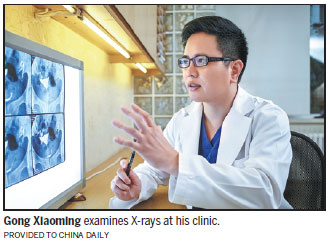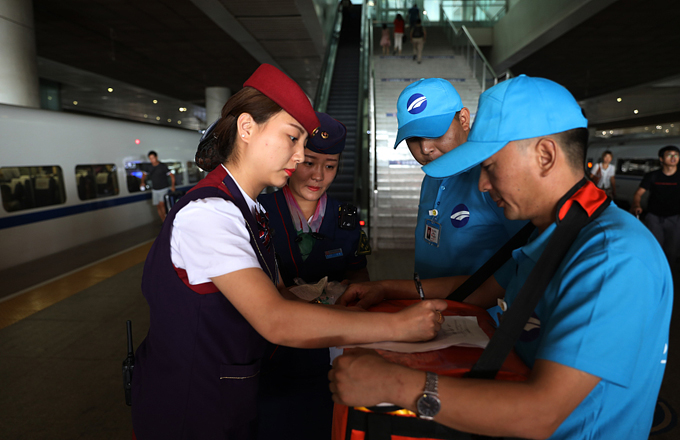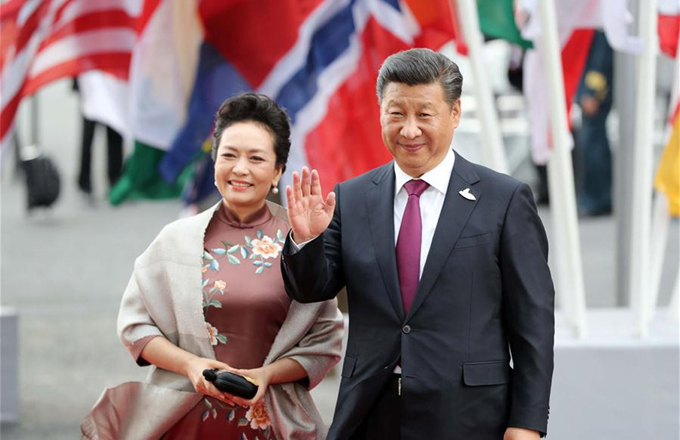A pioneering physician's freelance odyssey

Gong Xiaoming has a prescription for what ails China's health service: Set the doctors free.
The physician, who trained at the prestigious Peking Union College Hospital, has 15 years experience of working on the wards, and is highly regarded. In fact, the specialist in uterine fibroids once discovered that scalpers sold appointments for consultations with him for 3,000 yuan ($444), 400 times the official price.
"I should be proud," said the 45-year-old gynecologist.
However, in the winter of 2011, he was told a patient had waited overnight in temperatures of - 4 C to obtain a ticket for a consultation.
"I was shocked," Gong recalled. "How could patients suffer like that just to see a doctor?"
China's medical resources are extremely unbalanced: 80 percent of patients live in rural areas, but the best hospitals are concentrated in big cities, such as Beijing and Shanghai. Last year, an estimated 7 million patients from Hebei province alone visited hospitals in neighboring Beijing.
Gong admires his counterparts in the United States, whose patients have no difficulty accessing treatment. After visiting a clinic in Cleveland, Ohio, he said seeking treatment there was "almost enjoyable".
In 2013, Gong quit the public hospital system, where he worked as a contract doctor in hospitals in Shanghai and Shenzhen, Guangdong province. Last year, he went freelance and set up China's first gynecologist group, attracting more than 100 specialists as members.
Frustration
At school, Gong was shy and unsociable, but he was the top scorer in the national college entrance examination in his hometown in Zhejiang province. He followed his father's advice to study clinical medicine at university.
He began his career as a general practitioner, but was frustrated at dealing with so many patients with terminal illnesses. In response, he became a surgeon before moving into gynecology.
Gong earned his reputation by conducting a five-hour operation to save a young woman's uterus, removing 419 fibroid tumors individually. Other doctors had suggested a hysterectomy.
"I think about each patient's future," he said.
He now works in private hospitals where a consultation usually costs 420 yuan, about 60 times the official fee when he worked in public hospitals.
Some people have criticized Gong for "only working for the rich", but he countered by pointing out that doctors at private hospitals save patients hours of waiting, and more important, give more time to each consultation - at least 15 minutes.
"The doctors and the patients both benefit," he said.
Since 2009, government regulations have allowed doctors to register at more than one hospital or start their own clinics, but Gong has been a lonely pioneer.
By 2015, about 45,000 doctors had registered at more than one hospital, but only about 37 percent came from top public hospitals.
Those who hesitate to break away fear the loss of patients, because top public hospitals always have thousands more cases than private establishments.
"Chinese people prefer to judge doctors by the hospitals they work for," Gong said. "They trust public hospitals and trust the medical staff. So freelance doctors, who have been stereotyped as quacks in the past, have to compete in the market."
Internet medicine
Doctors must offer excellent services to please their patients, according to Gong, who established a website called China Obstetrics and Gynecology in 2000.
Initially, he used the site to share research and professional essays from overseas, but after he uploaded a video about a new method of treating postpartum bleeding, he received a message: "I saved a uterus today after learning about the treatment through your online video. Thank you very much."
That moment made Gong realize the huge power of the internet.
In 2012, he wrote an article in which he claimed that many women were diagnosed or even prescribed treatments for "cervical erosion", which is not a real condition in his opinion. He put the essay on Sina Weibo, where it was quickly reposted 33,000 times and garnered more than 4,000 comments.
He also has millions of followers on WeChat and other online clinics that share medical science and advice. He also offers two pregnancy apps.
Now, about 90 percent of his patients come to him through the internet.
The government is stepping up efforts to improve medical services. During the 13th Five-Year Plan (2016-20), medical consultations via family doctors will be encouraged, and the government will pilot a hierarchical medical system in 85 percent of China's regions. Medical competence at the grassroots level will be improved and more resources will be allocated for lower-tier institutions.
Gong and his team have also begun working with public hospitals in second- and third-tier cities, seeing patients and conducting surgeries at hospitals in the provinces of Hebei and Zhejiang.
Gao Xia, vice-president of the Zhangjiakou Women and Children's Hospital, said Gong's service not only attracts more patients, but also helps to train local staff: "Patients do not need to go to Beijing to see good doctors."
Every month, Gong flies to two or three cities, and even though his life is busier, he feels freer.
"I will keep working hard to improve healthcare in China," he said.























